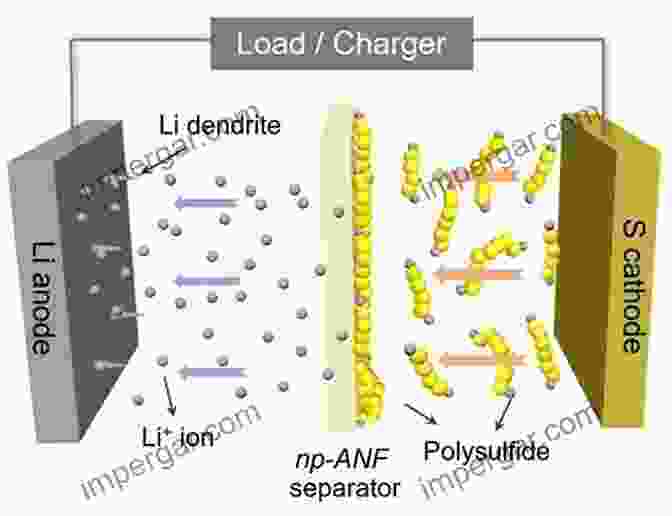Advancements in Rechargeable Lithium-Sulfur Batteries: Modern Aspects and Applications

4.5 out of 5
| Language | : | English |
| File size | : | 110783 KB |
| Text-to-Speech | : | Enabled |
| Screen Reader | : | Supported |
| Enhanced typesetting | : | Enabled |
| Print length | : | 725 pages |
Rechargeable lithium-sulfur batteries (Li-S batteries) have emerged as a promising technology for next-generation energy storage systems. They offer several advantages over conventional lithium-ion batteries, including higher energy density, lower cost, and improved safety. However, significant challenges remain in overcoming the limitations of Li-S batteries, including their poor cycling stability and low coulombic efficiency.
Construction and Working Principle
Li-S batteries consist of a sulfur cathode, a lithium metal anode, and an electrolyte. During discharge, lithium ions are extracted from the anode and migrate through the electrolyte to the cathode, where they react with sulfur to form lithium sulfide. During charge, the process is reversed, with lithium ions being extracted from the lithium sulfide and deposited back onto the anode.

Advantages of Li-S Batteries
- Higher energy density: The theoretical energy density of Li-S batteries is around 2500 Wh/kg, significantly higher than the 150-250 Wh/kg of lithium-ion batteries.
- Lower cost: Sulfur is a relatively abundant and inexpensive material, which contributes to the lower cost of Li-S batteries.
- Improved safety: Li-S batteries do not contain flammable organic solvents, making them less prone to fire and explosion.
Challenges in Li-S Battery Development
- Poor cycling stability: The polysulfide intermediates formed during the electrochemical reactions can lead to the dissolution of the cathode and loss of active material, resulting in poor cycling stability.
- Low coulombic efficiency: The formation of polysulfides can also lead to shuttle reactions, where the polysulfides migrate from the cathode to the anode and react with the lithium metal, resulting in a loss of efficiency.
Recent Advancements in Li-S Battery Research
Significant research efforts are underway to overcome the challenges faced by Li-S batteries. These efforts include:
- Development of new cathode materials: Researchers are exploring various cathode materials, including carbon-sulfur composites, metal-sulfur compounds, and sulfur-organic composites.
- Design of advanced electrolytes: The development of new electrolytes, such as ionic liquids and solid-state electrolytes, can help improve the stability and efficiency of Li-S batteries.
- Engineering of nanostructures: Nanostructured materials with high surface area and well-defined morphology can enhance the electrochemical performance of Li-S batteries.
- Development of protective layers: Coating the cathode or anode with protective layers can help prevent the dissolution and migration of active materials.
Applications of Li-S Batteries
Li-S batteries have the potential to revolutionize various industries, including:
- Electric vehicles: Li-S batteries can significantly increase the driving range and reduce the charging time of electric vehicles.
- Renewable energy storage: Li-S batteries can be used to store intermittent energy from solar and wind power sources.
- Portable electronics: Li-S batteries can provide longer-lasting power for portable devices such as laptops and smartphones.
Advances in rechargeable lithium-sulfur batteries hold great promise for revolutionizing energy storage and powering future technologies. By addressing the challenges related to cycling stability and coulombic efficiency, researchers are paving the way for the widespread adoption of Li-S batteries in various applications. Continued research and development efforts are expected to further enhance the performance and reliability of Li-S batteries, making them a game-changing technology for the future of energy storage.
4.5 out of 5
| Language | : | English |
| File size | : | 110783 KB |
| Text-to-Speech | : | Enabled |
| Screen Reader | : | Supported |
| Enhanced typesetting | : | Enabled |
| Print length | : | 725 pages |
Do you want to contribute by writing guest posts on this blog?
Please contact us and send us a resume of previous articles that you have written.
 Book
Book Novel
Novel Page
Page Chapter
Chapter Text
Text Story
Story Genre
Genre Reader
Reader Library
Library Paperback
Paperback E-book
E-book Magazine
Magazine Newspaper
Newspaper Paragraph
Paragraph Sentence
Sentence Bookmark
Bookmark Shelf
Shelf Glossary
Glossary Bibliography
Bibliography Foreword
Foreword Preface
Preface Synopsis
Synopsis Annotation
Annotation Footnote
Footnote Manuscript
Manuscript Scroll
Scroll Codex
Codex Tome
Tome Bestseller
Bestseller Classics
Classics Library card
Library card Narrative
Narrative Biography
Biography Autobiography
Autobiography Memoir
Memoir Reference
Reference Encyclopedia
Encyclopedia Tom Holmes
Tom Holmes Rajiv Chandrasekaran
Rajiv Chandrasekaran William Oettinger
William Oettinger Yessick
Yessick Shelley Wenger
Shelley Wenger J D Davis
J D Davis Luc Richard Ballion
Luc Richard Ballion Xianzu Tang
Xianzu Tang Trent Jamieson
Trent Jamieson Wen Zhu
Wen Zhu Margaret Ellen Newell
Margaret Ellen Newell W D Smart
W D Smart William Kingdon Clifford
William Kingdon Clifford Thomas Owens
Thomas Owens Stephen P Waring
Stephen P Waring Zbigniew Michalewicz
Zbigniew Michalewicz Laura S Brown
Laura S Brown Thomas Taylor
Thomas Taylor Tony Buick
Tony Buick Anne Rice
Anne Rice
Light bulbAdvertise smarter! Our strategic ad space ensures maximum exposure. Reserve your spot today!

 Christopher WoodsTales of a Scrappy New York Boyhood: A Nostalgic Journey Through the Grit and...
Christopher WoodsTales of a Scrappy New York Boyhood: A Nostalgic Journey Through the Grit and... Reed MitchellFollow ·12.7k
Reed MitchellFollow ·12.7k Gilbert CoxFollow ·6.1k
Gilbert CoxFollow ·6.1k Jim CoxFollow ·15k
Jim CoxFollow ·15k Benji PowellFollow ·13.6k
Benji PowellFollow ·13.6k Kirk HayesFollow ·19.3k
Kirk HayesFollow ·19.3k Herb SimmonsFollow ·19.4k
Herb SimmonsFollow ·19.4k Jason HayesFollow ·18.7k
Jason HayesFollow ·18.7k Scott ParkerFollow ·6.9k
Scott ParkerFollow ·6.9k

 Everett Bell
Everett Bell12 Horrific American Serial Killers: A Spine-Chilling...
Immerse yourself in the darkest recesses of...

 Ross Nelson
Ross NelsonDiscover the Enchanting World of "All That Love...
Prepare to embark on an...

 Cooper Bell
Cooper BellUnveiling the Secrets of Shoulder-Launched Munitions: The...
: Unlocking the World of Shoulder-Launched...

 Boris Pasternak
Boris PasternakHow Chance and Stupidity Have Changed History: A...
Prepare yourself for...
4.5 out of 5
| Language | : | English |
| File size | : | 110783 KB |
| Text-to-Speech | : | Enabled |
| Screen Reader | : | Supported |
| Enhanced typesetting | : | Enabled |
| Print length | : | 725 pages |














